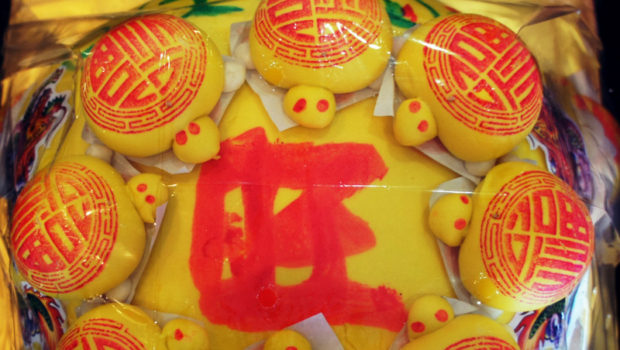
Nine Emperor Gods Festival
Words by Looi Sue-Chern
Soft tortoise-shaped buns in striking hot pink are a common sight in Chinese bakeries in Penang, a state with hundreds of temple shrines, but once a year the buns are dyed in bright yellow.

Nine Emperor Gods devotees buy yellow ‘mee koo’ during the festival to offer the Taoist deities as thanks for answering their prayers.
Yellow ‘mee koo’ (buns), as they are commonly known among the Chinese community, are in high demand during the Nine Emperor Gods festival, which is celebrated for nine days beginning on the eve of ninth lunar month of the Chinese calendar.
Third-generation baker Lee Chu Seng said his family’s shop Chuan Peng Heang on Jalan Jelutong in George Town, Penang, sells hundreds of freshly-made yellow ‘mee koo’ daily during the festival.

Lee Chu Seng mans the counter at his shop Chuan Peng Heang in Jelutong, Penang. He sells hundreds of yellow ‘mee koo’ in pairs during the Nine Emperor Gods Festival.
The standard tortoise-shaped buns are sold in pairs and are readily available, he says, but special ones have to be ordered a week in advance.
“The special ones are bigger so they require more work,” he says, as he shows where2 a specially ordered ‘mee koo’ at his shop that has yet to be collected by the customer.
The large ‘mee koo’ features a big tortoise more than twice the size of a regular one, and several tiny tortoises arranged on top of its shell. Chinese characters that read “peace for the family” are written on the large tortoise.
Lee said those observing the festival buy the yellow buns to offer to the deities as a gift of thanks or simply to offer respect.
“Some families might have prayed to the Nine Emperor Gods for something, like good health and success. When their prayers are answered, it is customary to offer thanks to the deities. So they offer the yellow buns. Yellow is the deities’ colour.

A Chuan Peng Heang staff dotting the eyes of the yellow ‘mee koo’ tortoises that are freshly made daily during the Nine Emperor Gods Festival.
“This is tradition. ‘Mee koo’ also signifying longevity and ‘peng an’ (peace), so people buy them every year for Chinese festivals,. These buns are also not expensive,” he says.
Lee’s shop has been in operation since his grandfather founded the business selling traditional biscuits like ‘tau sah pneah’ (tambun biscuits) and both pink and yellow ‘mee koo’ in 1945.

Biscuit and ‘mee koo’ maker Chuan Peng Heang makes hundreds of yellow ‘mee koo’ daily to meet demand during the Nine Emperor Gods Festival.
He says as an old business, they stress on quality, using high protein wheat flour and making sure the steamed buns have a fine texture.
The Nine Emperor Gods Festival this year ends on Sunday.



 Previous Article
Previous Article Next Article
Next Article